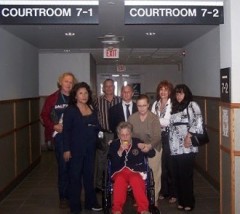Guardian Abuse of the Elderly
Legal guardian, Wikipedia
A legal guardian is a person who has the legal authority (and the corresponding duty) to care for the personal and property interests of another person, called a ward.
Usually, a person has the status of guardian because the ward is incapable of caring for his or her own interests due to infancy, incapacity, or disability. Most countries and states have laws that
provide that the parents of a minor child can designate who shall become the child's legal guardians in the event of death.
Courts generally have the power to appoint a guardian for an individual in need of special protection. A guardian with responsibility for both the personal well-being and the financial interests of
the ward is a general guardian. A person may also be appointed as a special guardian, having limited powers over the interests of the ward. A special guardian may, for example, be given the legal
right to determine the disposition of the ward's property without being given any authority over the ward's person. A guardian appointed to represent the interests of a person with respect to a
single action in litigation is a guardian ad litem. Read more
______________________________________
Aging In Place - Guide To Recognizing Elder Abuse
_______________________________________
Aging in Place is a resource hub for seniors and their families to learn more about the specific aspects of aging in place. You can visit our one stop shop for expert know-how in order to make the best decisions about in-home care, insurance, government assistance, and other financial resources, transportation options, and home remodeling.
Legal Services for the Elderly (Title III-B) provides legal assistance nationwide on issues such as income security, healthcare, long-term care, nutrition, housing, utilities, protective services, defense of guardianship, abuse, neglect, and age discrimination. This assistance is targeted towards older individuals in social and economic need.
Legal Services for the Elderly Program
Authorizing Legislation: Title III-B, Section 321, of the
Older Americans Act, as amended
The Purpose of the Program and How it Works
Legal assistance provided under Title III-B is part of the essential core of AoA’s legal assistance and elder rights programs. The legal services network can provide important assistance for older persons in accessing long-term care options and other community-based services. Legal services also protect older persons against direct challenges to their independence, choice, and financial security. These legal services are specifically targeted to "older individuals with economic or social needs."
There are approximately 1,000 OAA-funded legal services providers nationwide, which provide nearly one million hours of legal assistance each year. Legal assistance provided may involve:
- Access to public benefits, including SS/SSI/SSDI, Medicaid and Medicare, veterans benefits, and unemployment compensation;
- Drafting advance directives and designating surrogate decision makers who will effectuate older adults' wishes if they become incapacitated;
- Issues related to guardianship with a focus on representation for older persons who are the subject of guardianship actions;
- Access to available housing options, including low income housing programs that allow independence in homes and communities;
- Foreclosure or eviction proceedings that jeopardize the ability to stay independent in homes and communities;
- Gaining access to the full benefit of appropriate long-term care private financing options;
- Maintaining long-term financial solvency and economic security;
- Ensuring elder rights protections for older persons transferring from long-term care facilities to home and community-based care; and
- Elder abuse, including consumer fraud and the financial exploitation of older persons.
The legal assistance provided to thousands of older persons each year has a clear and direct positive impact on their ability to stay independent in their homes and communities, with optimized choice and individual autonomy, for as long as possible. The following examples demonstrate the benefits: Read more
The National Center on Law and Elder Rights serves as a centralized access point for a national
legal assistance support system serving professionals and advocates working in legal and aging services networks. Read
more
_____________________________________________
Florida Department of Elder Affairs
Florida Department of Elder Affairs
The Florida Department of Elder Affairs is the primary state agency administering human services programs to benefit Florida’s large and growing elder population.
Whether you are an elder or caregiver, a professional or volunteer who deals with aging issues, or just looking for information related to Florida’s older residents, this website is a valuable tool
for you.
Seniors hold a special place in Florida, which has the nation’s largest proportion of residents age 60 and older. On this website you may access information about health and wellness, long-term care,
community-based care, and Department projects and publications. Read more
2016 Summary of Programs and Services
2016 Summary of Programs and Services
This document is produced by the Florida Department of Elder Affairs and updated periodically to provide the public and the Legislature with information about programs
and services for Florida’s elders. Services and programs for elders vary in relation to consumer needs, demographics, funding availability and legislative directives. This Summary of Programs and
Services, unless otherwise noted, contains information and data compiled as of September 2015.
Department of Elder Affairs' Office of Legislative Affairs
Here you will find updated information on legislative action taking place within the Florida Legislature. Also listed:
- Annual Reports Required by Statute
- Annual Reports to the Legislature
- Presentations
- Budgetary Information
- End of Legislative Session Reports
- Links to Important Websites and Statutes
Florida Statutes, Social Welfare, Title XXX
Chapter 400, Florida Statutes, Nursing Homes and Related Health Care Facilities
Chapter 415, Florida Statutes, Adult Protective Services
Chapter 429, Florida Statutes, Assisted Care Communities
Chapter 430, Florida Statutes, Elderly Affairs
Chapter 744, Florida Statutes, Guardianship
Chapter 825, Florida Statutes, Abuse, Neglect, and Exploitation of Elderly Persons and Disabled Adults
Florida Statewide Public Guardianship Office
Statewide Public Guardianship Office
Generally, there are three types of guardians in Florida. If a court determines a person needs a guardian and that person has family or friends who can serve, then the court may appoint that family
or friend. These people are considered non-professional guardians. If the incapacitated person does not have a loved one who can and will serve, but they have assets, the court may appoint a
professional guardian to be paid from the person’s assets. If the incapacitated person does not have family or friends and is of limited financial means, then the court may appoint a public guardian,
if available. (2009 was the last year for a report)
2009 Statewide Public Guardianship Offic[...]
Adobe Acrobat document [1.2 MB]
SPGO anual report 2008 WebVersion.pdf
Adobe Acrobat document [573.6 KB]
NASGA Affiliate Thomas M. Fields Addresses Ohio Elder Abuse Commission
The YouTube videos (shown in nine parts) present a complete, uncut, unedited 30-minute video from the September 21, 2009 Meeting of the Ohio Elder Abuse Commission that was recorded as part of a project conducted by the National Coalition of Aging (NCOA), the Elder Justice Coalition (EJC), and the international human rights group WITNESS, Inc. Read more
2-22-10-Elder-Abuse-Commission-Public-Co[...]
Adobe Acrobat document [50.0 KB]
Testimony of Thomas Fields, Opposition t[...]
Adobe Acrobat document [19.7 KB]
2010, 04-01-10, letter, US Rep. Joe Sest[...]
Adobe Acrobat document [417.4 KB]
Advocating Legal Reform
by Tom Fields
May 4, 2009
Irving Fields died in Boca Raton, Florida in 1991. His estate was modest, under one million dollars. The size of the estate is really immaterial.
What would Irving want me, his son, to say here? This question is difficult to answer because so much changed for me on the day he died, just as so much changed for my father on the day two decades
earlier when my mother died. Read more
National Association to Stop Guardian Abuse
Dorothy Driesen, a 90 year old widowed Mother, has had her estate taken away from her by court decree and forced to reside at a nursing home that has had multiple
felony accounts charged against it in 2003.
The judge took our Mother into his chamber, asked her a few questions and then declared her incompetent, fired her son as Trustee, appointed a bank to be her new Trustee and set a court appointed
guardian over her. All of this happened within one days time upon the filing of court documents by the wannabe guardian and friend of the court.
After this drastic and unbelievable event in the local district court, the two sons of our Mother have been falsely accused of various things and incarcerated on three separate occasions. To add
insult to injury, the two sons of our Mother and their families have not been able to visit their Mother since August of 2008. Read more
Dr. Robert Sarhan Gets His Day In Court
Theft by court appointed guardians taking from the elderly is becoming more common and is part of an emerging industry. It is a scandal on the courts that participate in this theft from the elderly. Read more on the National Association To Stop Elderly Abuse And Exploitation blog
The National Coalition on Aging (NCOA)
The National Coalition on Aging (NCOA)
The National Council on Aging (NCOA) is a nonprofit service and advocacy organization headquartered in Washington, DC. Our mission is to improve the lives of older
Americans.
NCOA is a national voice for older adults - especially those who are vulnerable and disadvantaged - and the community organizations that serve them. We bring together nonprofit organizations, businesses, and government to develop creative solutions that improve the lives of all older adults. We work with thousands of organizations across the country to help seniors find jobs and benefits, improve their health, live independently, and remain active in their communities. Read more
Elder Justice Coalition (EJC)
The Elder Justice Coalition was formally launched on February 10, 2003, to coincide with the introduction of the Elder Justice Act (S. 333), which was introduced by
Senators John Breaux and Orrin Hatch. The Coalition has five founding organizational members: the National Committee for the Prevention of Elder Abuse (NCPEA), the National Academy of Elder Law
Attorneys (NAELA), the National Association of State Units on Aging (NASUA), the National Association of Adult Protective Service Administrators (NAAPSA), and the National Association of State
Long-Term Care Ombudsman Programs (NASOP). NCPEA has assumed the additional role of providing the physical and administrative home for the Coalition.
Authorized Electronic Monitoring (AEM) - Granny Cams
The state of Texas allows the family or guardian of a resident in a nursing home to monitor their loved one via a webcam, video surveillance camera, or similar device. It's called Authorized Electronic Monitoring (AEM) and is authorized under Subchapter R, Chapter 242, Health and Safety Code.
Texas DHS Information Regarding Authorized Monitoring (AEM)
Texas DHS Information Regarding Authoriz[...]
Adobe Acrobat document [248.1 KB]
Request for Authorized Electronic Monito[...]
Adobe Acrobat document [30.5 KB]
A facility must permit lawful monitoring per Texas Administrative Code
Texas Statutes - Subchapter R: Electronic Monitoring of Room
Rule 92.129, Authorized Electronic Monit[...]
Adobe Acrobat document [38.5 KB]
CBS News
July 18, 2010
In the future, you may not have to go far to care for aging loved ones. Whit Johnson has a first look at the MedCottage which could be a new option for caring for the elderly in your backyard.
Read more
Scandal: Professional Guardians earn up to $400 hour
Scandal: Professional Guardians earn up to $400 hour
From the National Association To Stop Elderly Abuse And Exploitation blog:
The beauty of being a guardian is there is no limit to the number of elderly people you can bill for guardianship duties, guardians have been known to make over $100,000 per client and payment is just about guaranteed by the court.
Another beautiful things about becoming a guardian is the old people are too sick and frail to complaint and even if they did , they have no one to complaint to! It's a recession proof business. Set Your own rates, the sky is the limit , your only limit is your own ability to contrive and connive.
Anyone who is elder and whose abilities are declining are good candidates to a forced guardianship, if they have no family or if they have discord within the family
your chances of success in this business greatly improve.
It is advantageous to have several lookouts for elders with money, Social workers who work hospitals can usually give you a good heads up on which elders are susceptible
to this procedure and the best part it is that it's all 100% Legal !
As millions of baby boomers age the demand for Guardians is about to explode, Do not be left out of fantastic opportunity to make millions within a very short period
time, buy real estate cheap! Jewelry, Bank Accounts, it's all there for the asking.
Do not let naive family members stand between money that could be yours . Become a guardian Now!
Ps. You might have to spread the wealth around, be prepared to give a 10% gratuity to keep the wheels greased. Read more
Laurie Roberts, Journalist for The Arizona Republic
Judge rules in favor of attorneys, not widow
Judge rules in favor of attorneys, not widow
The Arizona Republic
by Laurie Roberts
March 20, 2010
A Superior Court judge has ruled that a phalanx of probate attorneys were justified in collecting $576,000 from an 88-year-old widow the court was (supposed to be) protecting. The judge
rubber-stamped half of the fees without even holding a hearing into whether they were reasonable.
Judge Pro Tem Lindsay Ellis also signed off on the Sun Valley Group helping itself to more than $417,000 in guardian and companion care fees.
Meanwhile, Supreme Court Chief Justice Rebecca Berch this week announced a new initiative aimed at improving protections for vulnerable people. Among the issues to be addressed: fees charged by
guardians and fiduciaries.
She could start with the astounding case of Marie Long, an old lady worth $1.3 million when she came under the protection of Maricopa County's probate court in 2005. Today, she's destitute and
depends on taxpayers for support. Read more here
Judge orders Ellis, probate attorneys to his courtroom
Judge orders Ellis and probate attorneys to his courtroom
The Arizona Republic
by Laurie Roberts
March 22, 2010
An 88-year-old widow left destitute by a trip through Maricopa County's probate court may yet have a chance to get some of her money back.
Superior Court Judge Robert Budoff has ordered a hearing to determine whether Pro-Tem Judge Lindsay Ellis violated her ethical obligations when certain attorneys were given a sneak peek at her draft
order approving the draining of Marie Long's life savings. The hearing also will determine whether Ellis' ruling, which approved nearly $800,000 in fiduciary and lawyer fees collected from Marie,
should be tossed out.
Budoff has ordered Ellis and all attorneys involved in the case to his courtroom on June 7. This week's remarkable revelation that Ellis, through a judicial assistant, was communicating to one side
in the contentious case has dropped jaws across the legal community and calls into question whether Marie ever had a shot at a fair hearing. Read more
Probate court asked to sanction attorneys in Marie Long case
Probate court asked to sanction attorneys in Marie Long case
The Arizona Republic
by Laurie Roberts
April 9, 2010
A Maricopa County probate judge has been asked to punish a pair of attorneys in the case of the old lady who was worth $1.3 million and now depends on taxpayers for support.
No, it's not the attorneys who collected tens and even hundreds of thousands dollars from the old lady's trust who could be in trouble.
It's the attorneys who worked for free, the ones who tried to stop the wholesale draining of Marie Long's account, who could be on the hook.
Sun Valley Group is asking that attorneys Pat Gitre and Dan Raynak be sanctioned and ordered to pay $13,518 of the company's legal fees for suing Sun Valley.
This, apparently, is what you get in probate for trying to advocate for a defenseless widow. Read
more
Guardian balked at aiding widow while draining trust
Guardian balked at aiding widow while draining trust
The Arizona Republic
Laurie Roberts
April 21, 2010
In May 2009, Marie Long lost one of her hearing aids. She was 87 years old but still, I imagine the world sounded better in stereo.
Over the next month, her guardian, Sun Valley Group, would collect more than $5,500 from Marie to oversee her care but not a dime of that was spent on getting the elderly woman a new hearing aid.
When asked about it, court records show a lawyer for Sun Valley noted that hearing aids are pricey and questioned whether Marie needed two, "given her cognitive deficiencies."
Really, the lawyer said that.
Marie Long fell under the protective eye of Maricopa County’s probate court in 2005, after a stroke. Over the next four years, Sun Valley and a platoon of probate attorneys collected more than
$550,000 in guardian and legal fees until last year, when the elderly widow’s $1.3 million trust was tapped out.
Yet, attorneys for Marie and her sisters claim that she hadn’t had an eye exam in two years and that the insurance on her missing hearing aid had been allowed to lapse. They are objecting to requests
that a probate judge approve the final $100,000 that Sun Valley and its attorney collected for their final year of oversight in 2009, before Marie’s funds ran dry. Read more here
Elderly Millionaire Is Destitute After Payment of Fees for Lawyers and Care
Elderly Millionaire Is Destitute After Payment of Fees for Lawyers and Care
ABA Journal, Law News Now
April 13, 2010
By Debra Cassens Weiss
Marie Long was worth $1.3 million when she suffered a stroke and came under protection of a Maricopa County, Ariz., probate court in 2005.
Today the 88-year-old woman, Marie Long, is destitute after a judge approved $786,000 in attorney, guardianship and companion-care fees for the woman, columnist Laurie Roberts writes in the Arizona Republic. The woman’s onetime guardian, the Sun Valley Group, had assigned itself as Long’s caregiver, charging $235,000 for companion care and $182,000 for guardianship duties, Roberts wrote in a separate column last month.
Itemized charges included $32.50 to go to the bank for Long, $106 to pick up hearing aid batteries, and $62 to discuss a kitchen grease fire caused by a Sun Valley employee, Roberts says.
Judge Lindsay Ellis blamed Long’s court-appointed lawyer, as well as two lawyers for Long’s sisters, for driving up costs, Roberts says. The judge said the lawyers’ "venomous" and "hateful" attacks on the trustee, the guardian and their attorneys resulted in costly litigation.
But Roberts says it’s wrong to blame the three lawyers challenging the fees and instead points the finger at Ellis.
“The court that is supposed to be protecting people like Marie Long is doing no such thing,” Roberts writes. “Instead, the court is allowing a cozy group of lawyers and fiduciaries who are appointed to help vulnerable people help themselves to a nice pile of cash—until the money is gone, at which time the ‘ward’ is dumped onto the taxpayers.”
Now the Sun Valley Group is seeking sanctions against the two lawyers who represented the sisters, alleging they had no standing to sue for breach of fiduciary duty. The lawyers' suit had contended Sun Valley had a duty to investigate whether the Arizona Department of Veterans Services could have served as Marie's guardian, at a cost of only $75 a month.
Roberts decries the turn of events, especially since the lawyers worked for free. “This, apparently, is what you get in probate for trying to advocate for a defenseless widow,” she writes. more
Probate judge violates ethics code
Probate judge violates ethics code
The Arizona Republic
by Laurie Roberts
May 17, 2010
Hours before releasing a combative order that approved the draining of an 88-year-old widow's life savings, a Maricopa County probate judge sent a draft copy of her ruling to the attorneys who stood
to benefit – a violation of the judges' ethics code.
One of those attorneys responded to the March e-mail and even suggested several changes that were incorporated into Pro-Tem Judge Lindsay Ellis' 21-page ruling.
"I could not be happier," attorney Brenda Church replied, upon getting the proposed order.
I guess not. Church's bill for $333,000 was among nearly $800,000 worth about to be approved by Ellis.
Three other attorneys – Lauren Garner and Jerome Elwell who were working for the Sun Valley Group, and Brian Theut, the old lady's guardian ad litem – also received Ellis' draft ruling. None of them
reported Ellis to the Commission on Judicial Conduct or notified the attorneys representing Marie Long and her sisters of the improper "ex-parte" communication. Such contacts are a violation of the
Arizona Code of Judicial Conduct. Read more
In Debt and Under Fire, Attorney Grant Goodman Has Found an Unusual Pool of Clients: the "Victims" of Probate Court
Phoenix New Times News
By Sarah Fenske
April 15, 2010
Just about everybody who came into contact with Edward Ravenscroft in 2008 concluded that he needed some serious help.
Thanks to a bad crack habit, Ravenscroft, then 47, had burned through more than $1 million in two short years — with little to show for it. As an heir to the Abbott Laboratories fortune, Ravenscroft
was rich, but he was spending his money way too quickly, and stupidly. Even as his Scottsdale home was falling into foreclosure, he gave away $160,000 on a whim.
As is often the case with drug addicts, Ravenscroft started behaving erratically, leading to arrests for three different drug-related felonies in the span of one
month. While on probation, he was arrested in California and charged with attempted sexual assault, battery, and domestic violence. Shipped back to the Maricopa County Jail, he was looking at prison
time.
In court papers, Ravenscroft admitted that, in addition to his drug problem, he was mentally ill. His defense lawyer wrote that Ravenscroft described himself as bipolar and obsessive-compulsive.
Three different doctors agreed. So did the court-appointed psychiatrist who examined him in jail.
That diagnosis may have made all the difference. Under a program launched by the county's presiding judge, criminal defendants with mental illness end up in a special court to assess their
competency, and then, if need be, referred to probate court for help. Probate court deals with people who are legally incapacitated: anyone who can't take care of themselves or manage their finances
because of mental illness, old age, or disability. Read more
Minn. Supreme Court Disbars Lawyer Who Stole $60K from Elderly Dad
Minn. Supreme Court Disbars Lawyer Who Stole $60K from Elderly
Dad
ABA Journal Law News Now
June 11, 2010
By Debra Cassens Weiss
The Minnesota Supreme Court wants to deter elder exploitation by lawyers, including a lawyer who pleaded guilty to financial exploitation of her Alzheimer’s-afflicted father.
On Thursday, the court disbarred Minnesota lawyer Lisa Jane Mayne for stealing $60,000 from her father after he gave her power of attorney in 2005, the Minneapolis Star Tribune reports. The court
said it wanted to "deter future similar abuses by lawyers."
According to the story, the problem came to light after the assisted care facility for Mayne’s father sued for failure to pay $45,000. Mayne’s sister reported the
theft. Mayne pleaded guilty in 2008 to one count of financial exploitation of a vulnerable adult, and is paying $100 a month toward restitution of $46,000.
Mayne had sought a suspension followed by a period of probationary reinstatement. She suffered from major depressive disorder and hoarding behavior, and contended the problems should be considered in
mitigation. According to the opinion (PDF), she never learned to drive because of phobias, she failed to open most mail and file tax returns for several years, and her house was condemned in
September 2007 because of her hoarding.
But the opinion said the disorders did not directly cause the misconduct, and she is not entitled to mitigation, the court said. Two other mitigating factors—the absence of prior discipline and her
acknowledgment and treatment of psychological problems—fall short of what is needed to lower the sanction, the court said. Absent mitigation, a felony conviction generally warrants disbarment.
"Mayne’s misconduct was very serious and resulted in great harm to her father," the court said. "We seek to deter future similar abuses by lawyers acting as attorneys-in-fact, especially by those
acting as attorneys-in-fact for vulnerable persons."
Mayne’s lawyer isn’t available for comment. He’s Peter Erlinder, who is presently imprisoned in Rwanda in connection with his defense of an opposition political leader. Read more
Estate of Denial, Shining Light on the Dark Side of Estate Management
Final Indignities, An Editorial Investigation
On four consecutive Sundays, beginning Aug. 28, 1994, the St. Petersburg Times published a different kind of editorial. Final Indignities examined the estate system,
based on months of research and writing by editorial staff member Jeffrey Good. It appeared on the front page of the Perspective section to convey its importance.
Floridians should be able to face death trusting the legal system to carry out their last wishes. But we found that, too often, the trust is broken. We invite you to educate yourselves and join our
call for reform.
On April 18, 1995, Jeffrey Good joined an elite group of journalists when he won the St. Petersburg Times’ fifth Pulitzer Prize for this editorial investigation, "Final Indignities," which exposed
flaws in Florida’s probate system and detailed ways that personal estates are sometimes mishandled by lawyers and executors.
Broken Promises
By JEFFREY GOOD, staff writer
St. Petersburg Times, published August 28, 1994
First of four parts
Broken Trusts
By JEFFREY GOOD, Times staff writer
St. Petersburg Times, published September 4, 1994
Second of four parts
Forgotten Victims
By JEFFREY GOOD, Times staff writer
St. Petersburg Times, published September 11, 1994
Third of four parts
The Road To Reform
By JEFFREY GOOD, Times staff writer
St. Petersburg Times, published September 18, 1994
Last of four parts































































































































































